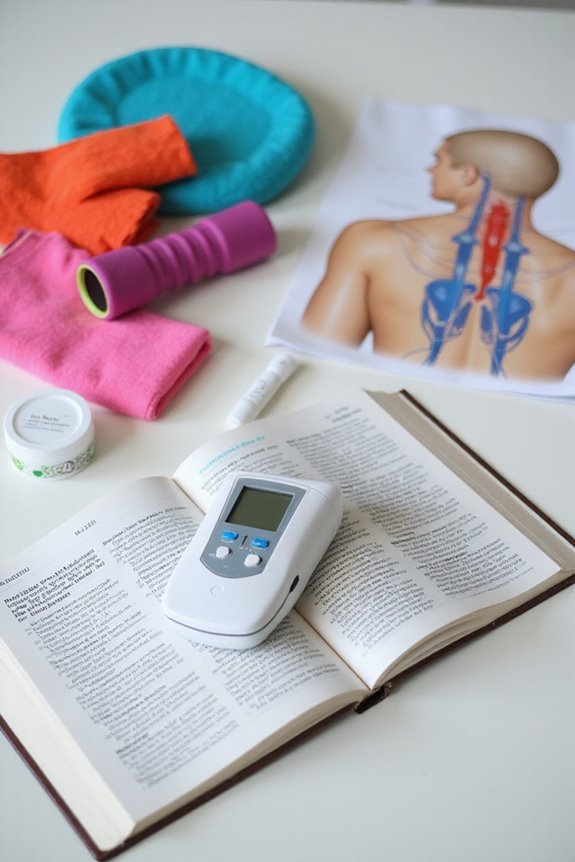Recommended self-help books for managing fibromyalgia include:
- “Fibromyalgia and Chronic Myofascial Pain: A Survival Manual” – Offers survival strategies.
- “The FibroManual” – Promotes patient-doctor collaboration.
- “The Mayo Clinic Guide to Fibromyalgia” – Provides evidence-based methods and debunks myths.
These texts emphasize symptom tracking, self-care, and thorough strategies for improved quality of life. They serve as essential resources for both patients and healthcare providers, offering insights into effective management techniques. Further exploration will reveal more specialized approaches.
Key Takeaways
- “Fibromyalgia and Chronic Myofascial Pain: A Survival Manual” offers survival strategies and symptom relief for managing fibromyalgia effectively.
- “The FibroManual” emphasizes collaboration between patients and healthcare providers for optimal symptom management and care.
- “The Mayo Clinic Guide to Fibromyalgia” provides science-backed methods and debunks common myths surrounding the condition.
- Journaling or using apps for symptom tracking helps identify triggers and medication effects, enhancing self-management.
- Resources on self-care strategies are crucial for improving quality of life for fibromyalgia patients.
Essential Guides for Fibromyalgia Management
Effective management of fibromyalgia requires thorough knowledge and practical strategies. Essential guides offer extensive insights into self-care strategies and symptom tracking, serving as valuable resources for patients and healthcare providers alike.
Key texts include:
- “Fibromyalgia and Chronic Myofascial Pain: A Survival Manual” – Focuses on survival strategies and symptom relief.
- “The FibroManual” – Encourages collaboration between patients and doctors for ideal management.
- “The Mayo Clinic Guide to Fibromyalgia” – Provides science-backed methods and myth-busting information.
These resources emphasize the importance of symptom tracking through journals or apps, allowing individuals to identify triggers and medication effects. By employing these self-care strategies, patients can enhance their quality of life while maneuvering through the complexities of fibromyalgia.
Practical Strategies and Worksheets for Daily Living

Practical strategies and worksheets play an essential role in enhancing daily living for individuals with fibromyalgia. Effective daily planning is vital for managing energy levels, enabling individuals to prioritize tasks and schedule activities during peak energy times, typically between 10 a.m. and 4 p.m.
To optimize energy management:
- Incorporate rest breaks, allowing for 10-minute periods of relaxation.
- Utilize worksheets to create structured daily routines that balance activities and rest.
- Set realistic daily goals to maintain motivation and manage expectations.
Engaging in low-impact exercises, such as walking, can also support physical health. In addition, journaling to track activities aids in identifying energy costs, promoting mindful living, and enhancing overall well-being within a supportive community.
Insights From Fibromyalgia Patients and Advocates

Numerous insights from fibromyalgia patients and advocates highlight essential strategies for managing this complex condition.
- Patient Empowerment: Understanding fibromyalgia can reduce anxiety, allowing individuals to take control of their health.
- Community Support: Patient groups and online forums provide validation and shared experiences, fostering a sense of belonging.
- Coping Strategies: Advocates recommend combining medical advice with self-help techniques for improved symptom management.
- Lifestyle Adjustments: Maintaining physical activity within tolerance levels is fundamental for overall well-being.
- Psychological Impact: Addressing the emotional toll of chronic pain is essential, with cognitive-behavioral approaches often suggested.
These insights reflect the importance of knowledge, support, and adaptive strategies in steering through the challenges of fibromyalgia effectively.
Integrative and Holistic Approaches to Healing

Integrative and holistic approaches to healing fibromyalgia incorporate a variety of methodologies aimed at symptom management and overall well-being.
- Integrative Therapies: These include lifestyle changes, acupuncture, and the use of natural supplements. Each therapy targets symptom relief without a definitive cure.
- Functional Medicine: Focuses on identifying root causes like inflammation and gut health, using personalized treatment plans to optimize management.
- Mind-Body Practices: Techniques such as yoga and tai chi enhance flexibility and reduce pain, promoting emotional regulation.
- Dietary Interventions: Anti-inflammatory diets, probiotics, and specific supplements can play significant roles in alleviating symptoms.
Together, these holistic healing strategies create a thorough resilience toolkit for individuals managing fibromyalgia, fostering greater overall health and symptom control.
Emotional and Psychological Aspects of Fibromyalgia

Emotional and psychological aspects play a vital role in the experience of fibromyalgia, as many patients report a complex interplay between their physical symptoms and mental health.
- Prevalence of Depression and Anxiety: Approximately three times more likely to develop depression, fibromyalgia patients frequently experience anxiety, greatly impacting daily functioning.
- Emotional Vulnerability: Heightened emotional sensitivity can lead to rapid mood swings and difficulty regulating emotions, contributing to a cycle of negative feelings.
- Negative Self-Perception: Patients often exhibit self-critical thoughts, exacerbating emotional distress and pain perception.
- Cognitive Reframing: Strategies that promote emotional resilience can help mitigate negative cognitive patterns, fostering a more positive outlook.
Addressing these aspects is essential for thorough fibromyalgia treatment, emphasizing the need for integrated mental health support.
Popular Titles With Positive Reader Feedback
Self-help literature has emerged as a significant resource for individuals managing fibromyalgia, offering diverse insights and strategies. Key titles recognized for positive reader feedback include:
- *Fibromyalgia and Chronic Myofascial Pain: A Survival Manual* – Evidence-based strategies for pain management.
- The FibroManual- Collaborative treatment advice, praised for usability.
- Reverse Therapyby John Eaton – Mind-body healing concepts.
- Mayo Clinic Guide to Fibromyalgia- Debunks myths, provides actionable strategies.
- The Fibromyalgia Advocate- Focuses on patient advocacy and coping mechanisms.
Reader experiences, often highlighted in author interviews, reveal that these books resonate deeply within the fibromyalgia community, fostering a sense of belonging and empowerment among those dealing with chronic pain.
Caregiver Support and Resources
Caregivers of individuals with fibromyalgia face unique challenges that necessitate access to a variety of support resources. Available caregiver resources include:
- Peer Support Groups: Provide strength and adaptation models.
- CFS-CARE: An online discussion group focusing on emotional support and caregiving challenges.
- ME Partner Caregivers Support Group: Offers scheduled sessions for interaction and resource sharing.
- Caregiving.com: Hosts a community of caregivers sharing experiences and advice.
- Empowering Caregivers: Provides emotional and spiritual support, both online and offline.
These resources are essential for preventing caregiver burnout, offering practical home care tips, and enhancing caregiver well-being. Engaging with these networks fosters a sense of belonging, allowing caregivers to share their experiences and strategies effectively.
Mind-Body Connection in Fibromyalgia Treatment
The mind-body connection plays a significant role in the treatment of fibromyalgia, as numerous studies suggest that integrating psychological and physical approaches may enhance symptom management.
- Mindfulness techniques, such as mindfulness-based stress reduction (MBSR), have shown promise in reducing clinical severity, although evidence regarding pain relief remains low to moderate.
- Meditative movement therapies, like tai chi, provide modest relief for symptoms, contributing to improved symptom perception.
- Relaxation techniques can calm the sympathetic nervous system, potentially lowering stress hormone levels and alleviating emotional-cognitive distress.
- Though many studies highlight benefits, limitations such as small sample sizes and insufficient controls necessitate further research to clarify neurobiological mechanisms and long-term efficacy.
Mind-body practices may serve as valuable adjuncts to thorough fibromyalgia treatment.
Techniques for Stress Reduction and Relaxation
Effective stress reduction and relaxation techniques are vital for managing fibromyalgia symptoms. Implementing mindfulness techniques can markedly enhance emotional self-regulation and acceptance. Mindfulness-Based Stress Reduction (MBSR) programs have shown improvements in pain, sleep quality, and overall quality of life for patients.
Key relaxation exercises include:
- Deep Breathing: Promotes relaxation by decreasing stress levels.
- Progressive Muscle Relaxation: Reduces tension and enhances body awareness.
- Guided Imagery: Helps in visualizing peaceful scenarios to alleviate stress.
Regular, gentle physical exercise complements these techniques, improving resilience against stress and fatigue. Cognitive Behavioral Therapy (CBT) also plays an essential role, modifying thought patterns and enhancing coping mechanisms. Together, these approaches offer a thorough strategy for symptom management in fibromyalgia.
Comprehensive Treatment Plans and Strategies
Managing fibromyalgia requires a detailed approach that integrates various treatment strategies to address the multifactorial nature of the condition.
Medication Management
- Pain relievers like acetaminophen or ibuprofen can alleviate pain; opioids should be avoided.
- Antidepressants such as duloxetine may reduce pain and fatigue.
- Anti-seizure medications, including gabapentin, modulate pain effectively.
- Personalized regimens are essential, with close monitoring for side effects.
Exercise Routines
- Low-impact aerobic exercises, such as walking and swimming, are essential for enhancing stamina and flexibility.
- Physical therapy can improve posture and reduce flare-ups.
- Gradual intensity increases are recommended to prevent muscle overexertion.
Incorporating these strategies into a thorough treatment plan supports holistic symptom management.
Frequently Asked Questions
How Can I Choose the Right Self-Help Book for My Needs?
To choose the right self-help book, one should consider personal preferences and specific symptoms. Engaging community recommendations and evaluating practical strategies can foster a sense of belonging while addressing individual challenges effectively.
Are There Any Fibromyalgia Books Specifically for Men?
Like a lighthouse guiding ships through fog, literature addressing male perspectives on fibromyalgia illuminates unique challenges. Few resources exist, yet emerging books offer tailored insights that resonate with men traversing their fibromyalgia journeys.
Do Self-Help Books Offer Online Resources or Support Groups?
Self-help books often provide valuable online support and community resources, linking readers to forums and peer groups. These connections foster belonging, enabling individuals to share experiences and coping strategies while enhancing their understanding of their conditions.
How Often Should I Read and Apply Strategies From These Books?
Reading frequency should be regular, with strategy application gradually integrated into daily life. This approach fosters understanding, motivation, and adaptability, helping individuals manage challenges effectively while feeling connected to a supportive community.
Can I Find Audiobooks or E-Books on Fibromyalgia Self-Help?
Like a soothing balm for weary minds, numerous audiobook platforms offer fibromyalgia self-help resources in e-book formats. These digital options provide comforting accessibility, allowing individuals to engage with valuable knowledge tailored to their unique journeys of healing.



